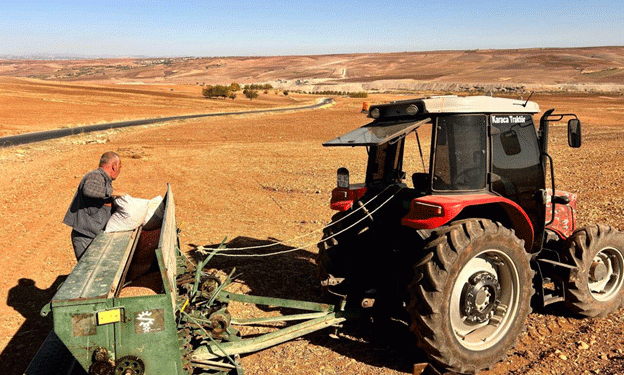The wheat planting season in Besni Plain, a critical agricultural area in the Southeastern Anatolia Region, has begun, with local farmers preparing their fields to sow certified wheat seeds. This area, known for its significant wheat production, sees its busiest season during the fall when farmers begin planting after harvesting the summer crops.
Farmers like Mahmut Aydın are already working the soil, using tractors to plow the land before sowing certified wheat seeds with the help of seed drills (mibzer). Aydın shared that, like every year, he has started sowing wheat, but the rising costs of agricultural inputs such as fertilizers and diesel are putting a strain on farming operations. “The weather is perfect, and it’s time to sow, but the rising costs of fertilizers and fuel are really making things harder,” Aydın explained. “It’s becoming increasingly difficult to manage these costs.”
This year, farmers in Besni are applying around 40 kilograms of fertilizer and seed per decare (approximately 1,000 square meters). After sowing, they begin their irrigation routine around the 2nd or 3rd of the month, followed by fertilization and pest control measures. If the weather conditions remain favorable, Aydın is hopeful for a good harvest, with an expected yield of 500 kilograms per decare.
Challenges Faced by Farmers
Despite the ideal planting conditions, the financial burden of rising input costs remains a significant challenge. The cost of fertilizers, which is a key input for wheat cultivation, has increased dramatically over the past year, along with the price of diesel fuel used in machinery. This has caused financial strain on farmers who are already struggling with low margins in a competitive agricultural market.
As a result, farmers are finding it difficult to maintain profitability, even with the potential for good harvests. The cost of fertilizers, often accounting for a large portion of a farmer’s production costs, is particularly impactful. Aydın notes, “Every year, the costs keep going up, but we still have to produce the crops to feed the nation and keep our farms running.”
Future Outlook and Sustainability
Despite these challenges, farmers remain resilient, hoping that good weather conditions will yield a higher-than-usual harvest. Many are turning to sustainable farming practices and seeking financial support through government subsidies and programs aimed at offsetting the costs of fertilizers and other essential agricultural inputs.
According to experts, Besni Plain’s wheat production is crucial not just for local consumption, but for national grain reserves, making it important for both farmers and government agencies to find solutions to the rising input costs. While wheat is a staple crop, farmers are beginning to explore more efficient and cost-effective ways of growing, such as through improved irrigation systems and optimized fertilizer usage.





